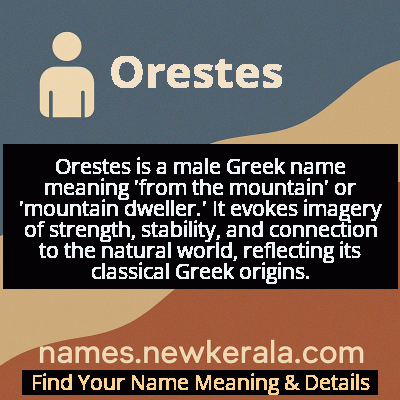Orestes Name Meaning & Details
Origin, Popularity, Numerology Analysis & Name Meaning of Orestes
Discover the origin, meaning, and cultural significance of the name ORESTES. Delve into its historical roots and explore the lasting impact it has had on communities and traditions.
Name
Orestes
Gender
Male
Origin
Greek
Lucky Number
2
Meaning of the Name - Orestes
Orestes is a male Greek name meaning 'from the mountain' or 'mountain dweller.' It evokes imagery of strength, stability, and connection to the natural world, reflecting its classical Greek origins.
Orestes - Complete Numerology Analysis
Your Numerology Number
Based on Pythagorean Numerology System
Ruling Planet
Moon
Positive Nature
Diplomatic, friendly, artistic, empathetic.
Negative Traits
Over-sensitive, moody, indecisive, prone to self-pity.
Lucky Colours
Green, cream, white.
Lucky Days
Monday.
Lucky Stones
Pearl, moonstone.
Harmony Numbers
1, 3, 4.
Best Suited Professions
Diplomats, mediators, caregivers, artists.
What People Like About You
Cooperative spirit, friendliness, artistic talent.
Famous People Named Orestes
Orestes of Macedon
Ancient King
King of Macedon who ruled briefly during the turbulent period after Alexander the Great's death
Orestes Brownson
Philosopher and Essayist
Influential American public intellectual and Catholic convert known for his philosophical writings
Orestes Destrade
Professional Baseball Player
Cuban-American first baseman who played in MLB and became a prominent baseball broadcaster
Orestes Kindelán
Baseball Player
Legendary Cuban baseball slugger considered one of the greatest players in Cuban baseball history
Name Variations & International Equivalents
Click on blue names to explore their detailed meanings. Gray names with will be available soon.
Cultural & Historical Significance
The cultural impact of Orestes extends beyond ancient Greece, serving as a foundational archetype in Western consciousness. His story has been reinterpreted across centuries in various artistic forms, from Renaissance paintings to modern psychological dramas, consistently representing the human struggle with inherited trauma and moral complexity. The Oresteia's conclusion, where Orestes is acquitted by the first jury trial in Athena's court, symbolizes civilization's progression from cyclical violence to institutional justice, making the name eternally connected to the evolution of legal and ethical systems.
Extended Personality Analysis
Individuals named Orestes are often perceived as intense, principled, and deeply loyal to family and justice, carrying an air of classical gravitas and determination. They may exhibit strong moral convictions and a sense of duty, sometimes struggling with internal conflicts between personal desires and higher obligations, reflecting the mythological Orestes' tragic dilemma. While they can be reserved and introspective, they also possess resilience and a capacity for transformation, often emerging stronger from personal trials with a refined sense of purpose and integrity.
These individuals typically demonstrate intellectual depth and a tendency toward philosophical contemplation, possibly influenced by the name's association with one of literature's most psychologically complex characters. They often show remarkable perseverance in adversity and a commitment to seeing difficult tasks through to completion, regardless of personal cost. The name suggests someone who bears responsibilities seriously and may feel the weight of expectations or legacy, yet possesses the inner strength to navigate moral complexities and emerge with their core values intact, much like their mythological namesake who ultimately found redemption through facing his destiny.
Modern Usage & Popularity
In contemporary times, Orestes remains a relatively rare but culturally resonant name, primarily used in Greek communities and by parents seeking classical names with deep literary and historical roots. While it has never reached mainstream popularity charts in English-speaking countries, it experiences periodic revivals among those appreciating Greek mythology and classical education. The name maintains a steady, though modest, presence in Greece and among diaspora communities, often chosen for its strong historical connections and distinctive, intellectual quality rather than following naming trends. Its usage reflects a preference for meaningful, timeless names over fashionable ones, appealing particularly to families with classical education backgrounds or interests in ancient history and literature.
Symbolic & Spiritual Meanings
Symbolically, Orestes represents the eternal struggle between duty and morality, embodying the concept of necessary transgression for the sake of justice and order. The name evokes themes of purification through suffering, the weight of ancestral curses, and the transition from primitive vengeance to civilized justice. Metaphorically, it signifies the journey from darkness to enlightenment, the burden of legacy, and the possibility of redemption through facing one's deepest moral challenges and accepting responsibility for difficult choices. The name carries connotations of transformation and catharsis, suggesting that through confronting and overcoming profound ethical dilemmas, one can achieve a higher state of understanding and personal integrity.

